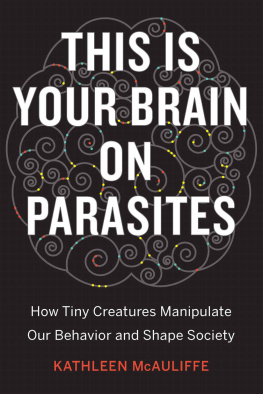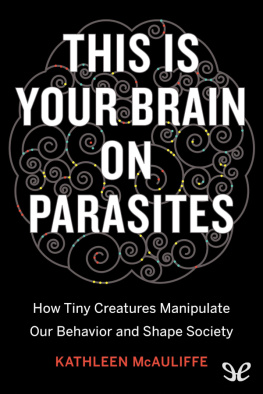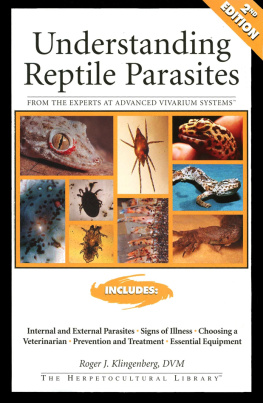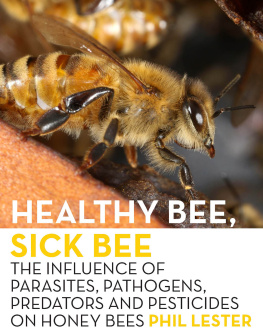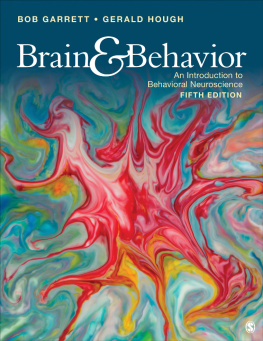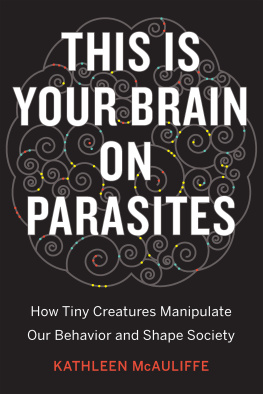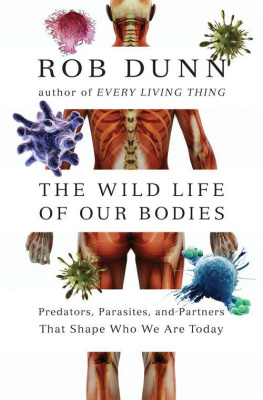Kathleen McAuliffe - This is your brain on parasites: how tiny predators manipulate our behavior and shape society
Here you can read online Kathleen McAuliffe - This is your brain on parasites: how tiny predators manipulate our behavior and shape society full text of the book (entire story) in english for free. Download pdf and epub, get meaning, cover and reviews about this ebook. City: BOSTON, year: 2016, publisher: HOUGHTON MIFFLIN HARCOURT, genre: Romance novel. Description of the work, (preface) as well as reviews are available. Best literature library LitArk.com created for fans of good reading and offers a wide selection of genres:
Romance novel
Science fiction
Adventure
Detective
Science
History
Home and family
Prose
Art
Politics
Computer
Non-fiction
Religion
Business
Children
Humor
Choose a favorite category and find really read worthwhile books. Enjoy immersion in the world of imagination, feel the emotions of the characters or learn something new for yourself, make an fascinating discovery.
- Book:This is your brain on parasites: how tiny predators manipulate our behavior and shape society
- Author:
- Publisher:HOUGHTON MIFFLIN HARCOURT
- Genre:
- Year:2016
- City:BOSTON
- Rating:3 / 5
- Favourites:Add to favourites
- Your mark:
- 60
- 1
- 2
- 3
- 4
- 5
This is your brain on parasites: how tiny predators manipulate our behavior and shape society: summary, description and annotation
We offer to read an annotation, description, summary or preface (depends on what the author of the book "This is your brain on parasites: how tiny predators manipulate our behavior and shape society" wrote himself). If you haven't found the necessary information about the book — write in the comments, we will try to find it.
This is your brain on parasites: how tiny predators manipulate our behavior and shape society — read online for free the complete book (whole text) full work
Below is the text of the book, divided by pages. System saving the place of the last page read, allows you to conveniently read the book "This is your brain on parasites: how tiny predators manipulate our behavior and shape society" online for free, without having to search again every time where you left off. Put a bookmark, and you can go to the page where you finished reading at any time.
Font size:
Interval:
Bookmark:

Copyright 2016 by Kathleen McAuliffe
All rights reserved
For information about permission to reproduce selections from this book, write to or to Permissions, Houghton Mifflin Harcourt Publishing Company, 3 Park Avenue, 19th Floor, New York, New York 10016.
www.hmhco.com
Library of Congress Cataloging-in-Publication Data
Names: McAuliffe, Kathleen, author.
Title: This is your brain on parasites : how tiny creatures manipulate our behavior and shape society / Kathleen McAuliffe.
Description: Boston : Houghton Mifflin Harcourt, 2016. | An Eamon Dolan book.
Identifiers: LCCN 2016002949 (print) | LCCN 2016009925 (ebook) | ISBN 9780544192225 (hardback) | ISBN 9780544193222 (ebook)
Subjects: LCSH: Nervous systemDiseases. | Parasitology. | Microbiology. | BISAC: SCIENCE / Life Sciences / Biology / Microbiology. | PSYCHOLOGY / Psychopathology / Schizophrenia. | MEDICAL / Microbiology.
Classification: LCC RC346 .M36 2016 (print) | LCC RC346 (ebook) | DDC
612.8dc23
LC record available at http://lccn.loc.gov/2016002949
Cover design by Martha Kennedy
e ISBN 978-0-544-19322-2
v1.0516
To my family, and in loving memory of my sister Sharon McAuliffe, a very talented science writer who died way too young
W E LIKE TO THINK of ourselves as in the drivers seat, choosing where to go, whether to speed up or slow down, when to switch lanes. We make the decisions and bear the consequences. This is a convenient, even necessary belief. If we jettison the notion of free will, the laws that hold people accountable for their actions begin to crumble. The world becomes an unruly or even terrifying place. Alien beings that turn us into zombies, bloodthirsty vampires, and sex-crazed robots are standard sci-fi fare precisely because they evoke the horror of losing control or, worse, becoming slaves to creatures bent on exploiting us for their own gain. So its disconcerting to think that an invisible passenger might also have a hand on the steering wheel, vying to move us in one direction when wed rather go another. When we let up on the accelerator, an unseen foot presses harder.
Parasites are like that invisible passenger. Adept at outwitting our immune systems, they sneak aboard our bodies and then the devilry begins. They cause rashes, lesions, aches, and pain. They eat us from the inside out; use us to incubate their young; sap our energy; blind, poison, maim, and sometimes kill us. But thats not the full extent of their clout. Some parasites have another trick up their sleevesan awesome hidden power that astounds and confounds even scientists who study them for a living. Simply stated, these parasites are masters of mind control. Whether as tiny as a virus or as big as a six-foot-long tapeworm, they have found all kinds of devious methods to manipulate the behavior of their hosts, and that includes, many researchers now strongly suspect, humans.
The impetus for this book was a discovery on the Internet. Im a science journalist and one day while foraging for interesting topics to write about I stumbled across information about a single-celled parasite that targets the brains of rats. By tinkering with the rodents neural circuitsexactly how is still a matter of fervid studythe invader transforms the animals deep innate fear of cats into an attraction, thus luring it straight into the jaws of its chief predator. This is a felicitous outcome not only for the cat but also, I was stunned to learn, for the parasite. It turns out the feline gut is exactly where the organism needs to be to complete the next stage of its reproductive cycle.
This revelation got me thinking about my own cat, who was fond of dropping dead rodents at my feet. Horrified as I was by this habit, I could not help admiring her hunting prowess. Now I wondered if it was she who was so clever or the parasite.
As I continued reading, more surprising news greeted me: The microscopic organism is a common inhabitant of the human brain because cats can transmit it to us when we come in contact with their feces. Perhaps the parasite was meddling with our brains too, speculated a Stanford neuroscientist associated with the research. I contacted him to find out what he meant and was pointed in the direction of a biologist in Czechoslovakia. Hes a bit of a wild man, he warned me, but I think it would be worth your while to speak to him. I called Prague and over the span of an hour was told a tale as bizarre as any Ive heard in my profession. It occurred to me on several occasions that the person at the other end of the line might be a kook, but I pushed those thoughts aside and kept listening because it was impossible not to. Im a sucker for a great story and this one had all the elements of a first-rate medical thriller. It was by turns creepy, scary, weird, and inspiring. Whats more, if true, it had important health ramifications.
After the conversation ended, I called around to other experts on this cat parasite for a reality check. I did this rather sheepishly at first, out of fear of sounding gullible. But one source after another said that the Czechs ideas, though far from proven, deserved serious scrutiny. His human studiesand the odyssey that led him down that path of inquirybecame the basis of a lengthy article I wrote for The Atlantic and are described in a chapter here, along with his most up-to-date results, so you can draw your own conclusions. (A word of caution: Before you get to that section, please do not panic and give away a pet cat. As I will explain in more detail, there are much more effective ways to protect against the infection than parting with a cherished companion.)
Over the course of investigating the topic, I came across many other stories of parasitic mind control; I learned of parasites that force their hosts to be their personal bodyguards, babysitters, chauffeurs, servants, and more. Sometimes scientists understand how they accomplish these feats; other times, theyre left scratching their heads. It seemed to me that neurosurgeons and psychopharmacologists could learn a lot from parasites.
Once I became aware of their antics, it was hard to look at the world outside my window in the same way again. Behind the scenes of the spectacle we call natural selection, I was surprised to learn, parasites are often directing the action, influencing the outcome of the battle between predator and prey. Insights into their stagecraft gave me a radically different perspective on ecology, evolutionary biology, and the spread of mosquito-borne scourges like malaria and dengue hemorrhagic fever.
While parasites coercive tactics have many disturbing implications for humans, the news from this front is not all bleak. Some microbes may actually improve our mental health. And invaders with sinister aims will have to contend with much more than our immune systems.
Mounting research suggests that hosts have developed powerful psychological defenses against parasites. Scientists call this mental shield the behavioral immune system. Experiments show that it kicks into action in situations where the threat of infection is high, prompting the organism in peril to respond in prescribed ways to reduce its risk. A simple example is a dog that reacts to being hurt by licking its wound, thus coating the injury with saliva rich in bacteria-killing compounds. In smart primates like humans, however, it appears that our behavioral defenses have become tied to increasingly abstract and symbolic ways of thinking. Many habits and traits that seem far removed from pathogenssuch as our political beliefs, sexual attitudes, or intolerance toward people who break societal taboosmay arise at least in part from a subconscious desire to avoid contagion. There is even evidence that the presence or absence of germs in our immediate surroundingsindicated by such signs as a rancid odor or filthy living conditionscan influence our personalities.
Font size:
Interval:
Bookmark:
Similar books «This is your brain on parasites: how tiny predators manipulate our behavior and shape society»
Look at similar books to This is your brain on parasites: how tiny predators manipulate our behavior and shape society. We have selected literature similar in name and meaning in the hope of providing readers with more options to find new, interesting, not yet read works.
Discussion, reviews of the book This is your brain on parasites: how tiny predators manipulate our behavior and shape society and just readers' own opinions. Leave your comments, write what you think about the work, its meaning or the main characters. Specify what exactly you liked and what you didn't like, and why you think so.

